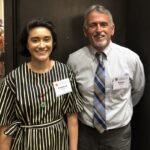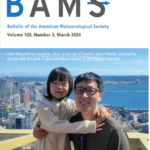ESSIC Faculty Research Assistant Stephanie Uz was recently asked by the NOAA Office of Education to participate in a briefing before the House of Representatives Oceans Caucus on NOAA Science Transforming Classrooms and Communities. The HOC is a bi-partisan congressional committee that targets oceanic issues.
Uz was approached as a presenter for the event given her work with NOAA's Environmental Literacy Grant project that interprets satellite data for the Science On a Sphere® (SOS) program. (ESSIC's Phil Arkin is a PI on the grant.) ELG's mission is to improve climate literacy for the public, so that Americans are kept well informed. In her talk, entitled, "Making NOAA data accessible to everyone," she compares some of the current methods used for research awareness.
"I gave the analogy to what the Weather Channel has done for NOAA weather service: make the science digestible by the public and relevant to their lives," Uz said.
NOAA's ELG program currently faces budgetary cuts as a result of the President's STEM consolidation plan, which involves budget cuts in areas of science, technology, engineering and mathematics. This is an unfortunate budget cut, according to Uz, who believes that research education is essential, especially for younger generations.
"[The cuts] would be a shame for the climate literacy of our general public," Uz said. "Americans should know about the latest climate science research to help us manage risks and opportunities."
So far, the project works with K through 12 schools, teachers, and the public to provide them with informative feature stories that are brief and easily understood by the community. Uz hopes that her presentation displayed the importance of science research education.
"I'm hopeful that changes will be made to the president's proposed budget," Uz said.
This was Uz's first time presenting information on Capitol Hill – an experience she referred to as "eye-opening" for making her realize the importance of staying involved and making her voice heard.






